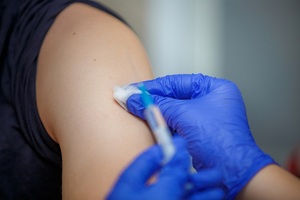HPV vaccination programme moves to single dose from September 2023
Teenagers and eligible GBMSM under the age of 25 will only require a single HPV jab from September, following updated advice from JCVI.

The change reflects evidence building up over recent years from a range of studies from around the world that shows that a single dose of the human papillomavirus (HPV) vaccine offers robust protection that is comparable to 2 doses. Based on the evidence, other countries, such as Australia and Scotland, have already made the move to one dose.
The HPV vaccine helps to prevent HPV related cancers from developing in boys and girls. While most types of HPV are harmless, some high-risk types can lead to the development of cancers, including cervical cancer, cancers of the head and neck (mouth and throat) and cancers of the anus and genital areas.
The HPV vaccine has been part of the NHS routine vaccination schedule since 2008 and is one of the most successful in the world, with high uptake and millions of doses given.
From September 2023:
- routine adolescent HPV immunisation programme for all children in school year 8 (aged 12 to 13 years) will move from 2 doses to one dose, offered mainly in secondary schools – this includes children not in mainstream school via a community clinic delivery model
- eligible gay, bisexual, and other men who have sex with men (GBMSM) under the age of 25 will move from 2 doses to one dose, offered through sexual health clinics
- eligible GBMSM aged 25 to 45 years will remain on a 2-dose schedule, offered through sexual health clinics
- eligible individuals who are immunosuppressed or those known to be HIV-positive will remain on a 3-dose schedule
- catch-up: eligible individuals who started their HPV vaccination schedule and have already received one dose of the vaccine by September 2023 will be considered fully vaccinated – those who missed out on their one dose HPV vaccine can catch up until their 25th birthday via their GP practice
The Joint Committee on Vaccination and Immunisation (JCVI) reviewed evidence gathered over several years and ran a public consultation, with their final advice to health ministers on changes to the programme published in August 2022.
Similarly, the World Health Organization (WHO)’s Strategic Advisory Group of Experts on Immunisation (SAGE) published a review in April 2022 which concluded that a single-dose of HPV vaccine ‘delivers solid protection against HPV’ that is comparable to a 2-dose schedule.
The reviews also concluded that immunocompromised individuals, including those who are HIV positive, should continue to receive 3 doses as there is limited evidence regarding the efficacy of a single dose in this group.
Dr Vanessa Saliba, Immunisation Consultant Epidemiologist at the UK Health Security Agency (UKHSA), said:
The HPV vaccination programme is one of the most successful in the world and has dramatically lowered the rates of cervical cancer and harmful infections in both women and men – preventing many cancers and saving lives.
The latest evidence shows that one dose provides protection as robust as 2 doses. This is excellent news for young people.
If you missed your HPV vaccine, it is vital you get protected. Contact your school nurse, school immunisation team or GP practice to arrange an appointment – you remain eligible to receive the vaccine until your 25th birthday.
National Director for Screening and Vaccinations Steve Russell said:
This is another step forward for our world-leading HPV vaccination programme, which saves lives by significantly reducing the risk of cervical cancer.
With one quick HPV jab now making it simpler than ever to reduce your risk of cancers caused by the virus, it’s so important that people come forward when invited. Along with getting your HPV vaccine, it is also still vital to book in for your cervical screening appointment, which checks for high-risk HPV and remains one of the best ways to protect yourself from cervical cancer.
The NHS HPV vaccination programme in England has been shown to have dramatically lowered HPV infections and rates of cervical cancer in vaccine-eligible women, with the strongest effects seen in those offered vaccination at younger ages. HPV vaccination also protects men and women against genital warts and other cancers of the genital areas and anus, as well as some mouth and throat (head and neck) cancers. Reductions in diagnoses of genital warts to the end of 2022 have been recently reported by UKHSA.
A study published in The Lancet in 2021 found that cervical cancer rates were 87% lower in young women who had been eligible for HPV vaccination when they were aged 12 to 13 years, compared to young women who had not been offered vaccination, providing strong evidence the programme is preventing cervical cancers. Overall, the study estimated that the HPV programme had prevented about 450 cancers and 17,200 pre-cancers up to mid-2019.
The latest UKHSA report published in December 2022 on the routine adolescent HPV vaccination programme for 2021 to 2022, which is primarily delivered in schools, shows that coverage in year 8 and year 9 pupils is yet to return to pre-pandemic levels.
UK Health Security Agency press office
10 South Colonnade
London
E14 4PU